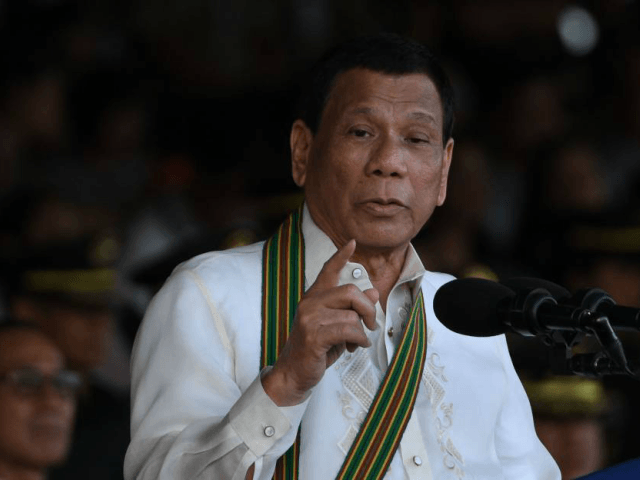President Rodrigo Duterte’s spokesman Salvador Panelo defended on Tuesday the Philippine head of state’s proclamation that he was once gay and chose to change his sexuality, stating that Duterte is “always conscious on not offending” marginalized groups and saying of the LGBT community, “they should be happy.”
Duterte claimed, in remarks that sounded potentially joking, that he was once gay as a young man but that marrying ex-wife Elizabeth Zimmerman “cured” him. He has claimed to have been bisexual in the past, admitted to non-consensual sexual encounters with a Catholic priest, and called for the Catholic Church to allow priests to have same-sex partners.
Duterte has gone back and forth on supporting same-sex marriage, at times stating he would support it if it was the “trend of the times” but at others stating it is impossible in the Philippines because “we are Catholic.”
Duterte is a vocal and consistent critic of the Catholic Church and has encouraged Philippine citizens to “kill bishops.”
His recent remarks on his sexuality have triggered worldwide outrage because he said he had “cured” himself of being sexually attracted to men, suggesting that homosexuality is a disease that one can “cure,” rather than an immutable trait.
“The remarks meant that he had ‘changed’ his sexual preferences. What’s wrong [with that]?” Panelo told reporters on Tuesday. “Let me say that the President is always conscious of not offending the sensibilities of these special classes. He is a kind person.”
“Pero [but] I don’t think that was … I don’t know — I don’t know if it should offend them [LGBT people,” Panelo continued, switching from English to Filipino. “Why is the gay community offended? They should be happy.”
Panelo added that, by using the word “cured” to describe his change, Duterte “meant … he changed his sexual orientation.”
Panelo defended Duterte shortly before he released an uncharacteristically peaceful statement to observe Eid al-Fitr, the official end of the Muslim holy month of Ramadan.
“Take this an an opportunity to deepen your role as instruments of love, sacrifice, respect, and selfless service and may each of you remain our government’s partner in promoting peace and understanding among Filipinos from all walks of life,” Duterte’s message read.
Duterte’s call for peace contrasts significantly with his repeated threats to kill suspected drug criminals and physically attack members of the Catholic clergy, and orders to Philippine police to kill suspects and shoot communist women “in the vagina.” His eagerness to use outrageous language has made him the target of near-ceaseless criticism since he took office in 2016.
Duterte made the remarks about his sexuality last week during an event for the Philippine community in Japan, which he visited for meetings with Prime Minister Abe Shinzo and other senior officials. He first accused a longtime political critic, Senator Antonio Trillanes IV, of appearing gay, using a joking tone. He then compared himself to Trillanes and claimed that he, too, was gay, but that he had been “cured” by his ex-wife and his current partner.
“You ask any gay person who sees Trillanes move, they’ll say he’s gay,” Duterte said, appearing to joke. “Good thing Trillanes and I are similar. But I cured myself. When I began a relationship with Zimmerman, I said, this is it. I became a man again.”
Duterte also added, “I don’t care if I’m gay or not.”
Many in the LGBT community noted that it remains an all-too-recent development that mainstream health leaders no longer view queer sexualities as diseases to be cured and that Duterte’s may help justify that way of thinking.
“He implied that being queer was a disease that could be cured by a beautiful member of the opposite sex. It was even a good thing, he said, that he was able to cure himself,” Rappler writer Rambo Talabong wrote about the comments. “With one stroke, he resurfaced the wrong notion of homosexuality as a disorder and the twisted view of being gay as something that is undesirable.”
Duterte has issued conflicting statements on same-sex marriage, which remains illegal in the Philippines.
“If that will add to your happiness, I am for it,” he said of the policy in late 2017. “I am for (same) sex marriage if that is the trend of modern times … Why impose a morality that is no longer working and almost passe?”
Prior to those comments, however, Duterte said that he believed same-sex marriage was only possible in the West because “that is their culture,” while, in the Philippines, “that can’t apply to us because we are Catholics.” Nearly 90 percent of citizens in the Philippines belong to the Catholic Church.
Duterte, who has repeatedly claimed to be the victim of child molestation at the hands of a Catholic priest, has made clear his distaste for Catholicism in many public remarks, suggesting that, while he may think that Catholic culture prevents the Philippines from accepting same-sex marriage, he personally may not agree with the Church. Duterte has recommended that the Catholic Church allow priests to “have boyfriends” to lower the rates of sexual abuse and claimed that “90 percent” of priests are gay. He has also encouraged Filipinos to leave the Church, stop praying to “drunkard” saints, and said he has considered founding his own church.

COMMENTS
Please let us know if you're having issues with commenting.